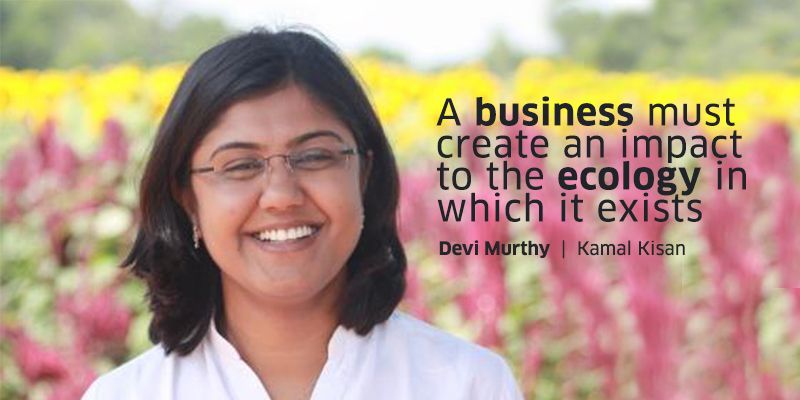Kamal Kisan aims to help small farmers with innovative agricultural equipments
“I always find farmers amused to see a woman working in the fields with machines. But it attracts them to come and take a look at what we are doing, and has helped us get more supportive feedback from them. It has been a blessing in disguise,” says Devi Murthy, founder of Kamal Kisan. Devi spends more time in the farms in and around Karnataka than in her office. She is an electrical engineer from Drexel University who worked as a Product Manager developing sheet metal products after her graduation. She was acquainted with social businesses while pursuing Masters in Entrepreneurship at IIM Bangalore.

Devi says, “I was looking for an avenue to utilize my skills of sheet metal product development engineering to create positive change. A classmate suggested that I consider working on agriculture equipments. I was intrigued but wanted to be sure that there exists a real gap that I could fill. I spent over two years visiting various universities, research institutes and interacting with farmers.”
She founded Kamal Kisan in 2012. Kamal Kisan aims to develop a series of farm equipments especially targeted towards small farm owners. These equipments will then be provided as a mechanized service directly on the farm. The equipments can substitute farm activities which are heavily labour-dependent and contribute a significant amount to the total cost of crop production.
Devi shares that farm lands with less than five acres of area constitute more than 80% of farm holdings in India today. Increasing non-availability of labour is a major concern among farmers as it leads to low productivity. Adaptation to mechanized processes is a constraint since most of the machines available are not suited for small farms. In cases where machines are available, access to service and spares are limited, which is particularly important considering agriculture is a time sensitive activity.
Kamal Kisan works with a franchise-based model to deliver farm equipments, which can substitute the farming activities carried out by labour, as a service to the farmers. The rationale behind choosing the service model is to effectively deliver equipments to the farmer as a variable expense rather than a capital investment, which can be extraordinarily challenging for small and marginal farmers. She feels that “a business must not exist for the sole purpose of earning revenues but must also create an impact on the ecology in which it exists.”

Kamal Kisan makes use of various outreach centers, extension offices and self-help groups to set up its service network. A group of rural workers are selected to become service providers. Kamal Kisan was bootstrapped for initial six months since incorporation. It was given a seed fund of Rs.5 lakhs from IIT Madras’s rural technology and business incubation center. Kamal Kisan is a four-member team and has launched its first product, rice transplanter, last month. Potato and legume harvester, vegetable and fruit transplanter, coconut harvester, sugarcane transplanter and harvester are other equipments under development. The rice transplanter utilizes a traditional nursery method with manual separation for easy adaptability and is mechanically operated with a hand pedal. The target cost to the end user is estimated at Rs.1000 per acre of crop sown.
Most farmers are skeptical about agricultural implements because of their past experiences and it is a challenge to convince them to try the service. “Making them believe that we will provide the equipments as a service in the right time of need and we offer it at a small fee is not easy. But some farmers, whom we have provided our services to, invited me to their homes. They told me that they appreciate our inputs and are eagerly looking forward for more services. It is a huge encouragement for us. We are striving to reduce agricultural labour costs for these farmers by 50% through our agricultural interventions. We hope to reach at least 50,000 farmers by 2015,”says Devi.
Read more stories of social enterprises in the agriculture sector here.











